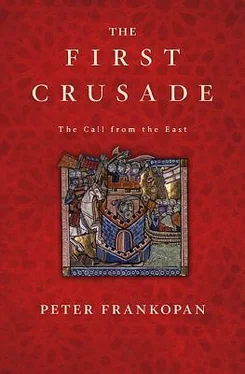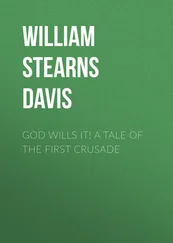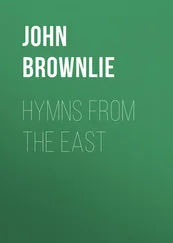Urban’s speech at Clermont created shock waves across Europe, as news of an impending armed pilgrimage that would seek to journey to Jerusalem travelled rapidly. Interest was fanned by energetic clergy like Robert of Arbrissel who was told to preach in the Loire valley, where there was no shortage of attentive well-heeled aristocrats; 14Jarento, abbot of Sainte-Bénigne of Dijon, was likewise sent to recruit suitable figures, heading first to Normandy and then to England. 15Areas like the Limousin in France turned into hives of activity, with the Crusade message being spread with great enthusiasm and efficiency. 16
The clergy everywhere disseminated the Pope’s message, under strict instructions to report only his exact words and not to embroider them. But the main brunt of galvanising support fell on Urban himself. 17In the months that followed his initial call to arms, the Pope remained in France, moving from community to community. He stayed on the move in 1095 and 1096, persuading, cajoling and exhorting the faithful. He gave addresses at Limoges around Christmas, and at Angers and at Le Mans in the spring of 1096, before heading south to Bordeaux, Toulouse and Montpellier, and addressing another church council in Nîmes in July. As the Pope moved from town to town, from one church foundation to another, local chroniclers were left in little doubt about the purpose of his visit. As one writer put it, Urban reached Le Mans in order to ‘preach the journey to Jerusalem and came to these parts for the sake of this preaching’. 18A grant to one church in Marcigny was dated to the year ‘when Pope Urban came to Aquitaine and moved the army of Christians to repress the ferocity of the pagans in the east’. 19The whole world was stirring, straining to march to Jerusalem. 20
Letters were sent out to the places that Urban could not visit in person. He did not travel to Flanders, for example, no doubt because this was a region that had already been successfully cultivated by Alexios in the 1090s. Nevertheless, he sent a letter to the princes, clergy and people of Flanders explaining his efforts to secure help for
Christians who were being persecuted. As they already knew well, the barbarians in the east were causing immense destruction. ‘Grieving at the scale of this disaster, and moved by pious concern’, Urban wrote, ‘we have been visiting the regions of Gaul and devoting ourselves to urging the princes of this land as well as their subjects to free the churches of the East. We have solemnly enjoined on them at the Council of the Auvergne the importance of this undertaking, in preparation for the remission of their sins.’ 21
The idea that participation in the expedition would be rewarded by the forgiveness of sins was designed to widen the appeal of the Crusade even further. Whereas previous calls to arms by Gregory VII, and for that matter by Alexios I himself, had talked of the obligations that Christians had towards each other and of the solidarity they ought to show in times of need, what the Pope was offering was altogether more powerful. Those who took part were not just doing their duty, they were earning salvation.
Urban consistently reiterated the spiritual rewards on offer. Writing to his supporters in Bologna, the Pope noted that he was delighted to learn that many wanted to join the expedition to Jerusalem. ‘You should also know’, he went on, ‘that if any of you make the journey, not for the desire of worldly goods, but for the salvation of your souls and the liberation of the church, you will be relieved of the penance for all your sins, for which you shall be judged to have made a full and perfect confession.’ 22Joining the expedition to Jerusalem would also benefit those who had specific sins to atone for. According to one chronicle, Urban suggested to ‘certain French princes who could not perform a fitting penance for innumerable offences committed against their own people’ that taking the oath and making the journey was a suitable act of contrition, which would bring profound spiritual rewards. 23
‘If anyone dies in expedition for the love of God and of his brothers’, Urban wrote in a letter to the counts of Besalú, Empurias, Roussillon and Cerdana, ‘let him not doubt that he will assuredly find indulgence of his sins and will participate in eternal life, through the merciful compassion of our God.’ 24Yet it took time for this concept of martyrdom and salvation to be fully accepted by the Crusaders. It seems to be only later in the campaign that the idea became established, possibly as a result of the profound suffering that the Crusader army experienced, especially at Antioch in 1098, which served to intensify a belief in spiritual rewards for those who paid the ultimate price for defending their faith. 25Important though these incentives were, however, they are rarely mentioned in the sources that outline why particular individuals decided to take part in the expedition. Guy and Geoffrey of Signes, two brothers from Provence, simply stated that they were making arrangements to journey east in order ‘to wipe out the wickedness of the pagans and the excessive madness because of which countless Christians have already been oppressed, taken prisoner or killed with barbaric fury’. 26
Urban’s rhetorical cocktail of Christian suffering, spiritual reward and the destination of Jerusalem was intoxicating. And he had another powerful tool. As the Pope moved around France, he consecrated the altars of many churches, such as the Church of the Trinity in Vendôme and the abbey churches at Marmoutier and Moissac, a large number of which were given parts of the Holy Cross. 27There was no more emotive relic connected to the liberation of Jerusalem; not for nothing did those participating in the expedition take the way of the Cross (hence ‘Crusade’) and indeed marked their clothes with this symbol. 28
More pertinently, it was well known that pieces of the Cross were kept in Constantinople and had been used as an important instrument of imperial diplomatic policy from the fourth century, when Constantine the Great gave precious fragments to the Sessorian Palace in Rome. The Holy Cross was the great prize of Byzantium’s international diplomacy. 29So while it is not impossible that Urban was distributing fragments already held in the papal treasuries, it is more plausible that the relics, so closely associated with Constantinople, were provided by Alexios.
This high-profile channelling of significant relics contributed to the excitement sweeping through France, with the Pope, meanwhile, tirelessly ‘exhorting our people to go to Jerusalem in order to hunt the pagans who had occupied this city and all the lands of the Christians as far as Constantinople’. 30Other resources were perhaps also being used to galvanise support, as in the case of a document recording the destruction of the Church of the Holy Sepulchre at the start of the eleventh century whose intention was not just to inflame anger about Jerusalem, but specifically to link the Muslims to Christian suffering. 31That the expedition was to provide military support to Byzantium was not always clearly articulated; the lure and name of Jerusalem was much more enthralling to the Pope’s audience than mission detail.
Knights scrambled to make the necessary preparations. Achard of Montmerle was one who promptly did so, coming to an arrangement with the monastery of Cluny by placing a charge over his lands in return for ‘the sum of 2,000 [gold coins] and four mules’. Reckoning that he needed additional means to make the long journey to Jerusalem, Achard declared that if he died or decided not to return, ‘rightful and hereditary possession in perpetuity’ would pass to Cluny and ‘its eminent men’. The funds were being raised, noted the agreement, ‘because I wish to be fully armed and join the magnificent expedition of the Christian people seeking to fight their way to Jerusalem for God’. 32
Читать дальше











